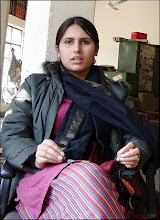Afghan bride wins 'maintenance'
By Moska Najib
BBC News, Delhi
 A court in the Indian capital, Delhi, has ordered an army doctor to pay monthly maintenance to an Afghan woman who has accused him of bigamy.
A court in the Indian capital, Delhi, has ordered an army doctor to pay monthly maintenance to an Afghan woman who has accused him of bigamy.The Delhi court said that Sabra Ahmadzai's case of bigamy against the doctor, Maj Chandrashekhar Pant, was legitimate.
It directed Maj Pant to pay Ms Ahmadzai 8,000 rupees ($169) every month.
Maj Pant has denied marrying Ms Ahmadzai, saying his appearance in a wedding video was fabricated.
Ms Ahmadzai alleges that Maj Pant told her he was already married with two children after their wedding.
The ruling is only an interim order. A full judgement is yet to be delivered.
But a magistrate at the Mahila Court in Delhi, which resolves disputes related to women's issues, said she believed that "a prima facie case of economic abuse falling within the definition of domestic violence as given under [the Protection of Women from Domestic Violence Act] is made out in favour of the applicant".
The court also confirmed Ms Ahmadzai's association with Maj Pant as a "relationship in nature of marriage".
Maj Pant's lawyer did not respond to phone calls from the BBC. The defence ministry has not commented apart from saying earlier in the year that it would investigate the case.
Ms Ahmadzai's lawyer, Ravindra Garia, said she would pursue the case further.
"We would like the court to pass a similar final order, so she gets compensated for the mental trauma caused by her husband's conduct," he said.
Ms Ahmadzai was working as a Hindi translator in a hospital in Kabul when she says she met Maj Pant.
She said that she decided to marry him after he converted to Islam and after receiving the consent of her family and relatives.
Ms Ahmadzai said they were "together for about 15 days when he was transferred back to India".
"He promised to return with his parents and left. In six months he only called me three times, and in his last call he told me, 'Sabra you are young and you can marry again - I have two kids and a wife from before'," she told the BBC in February.
In Afghanistan marrying a foreigner is still taboo.

